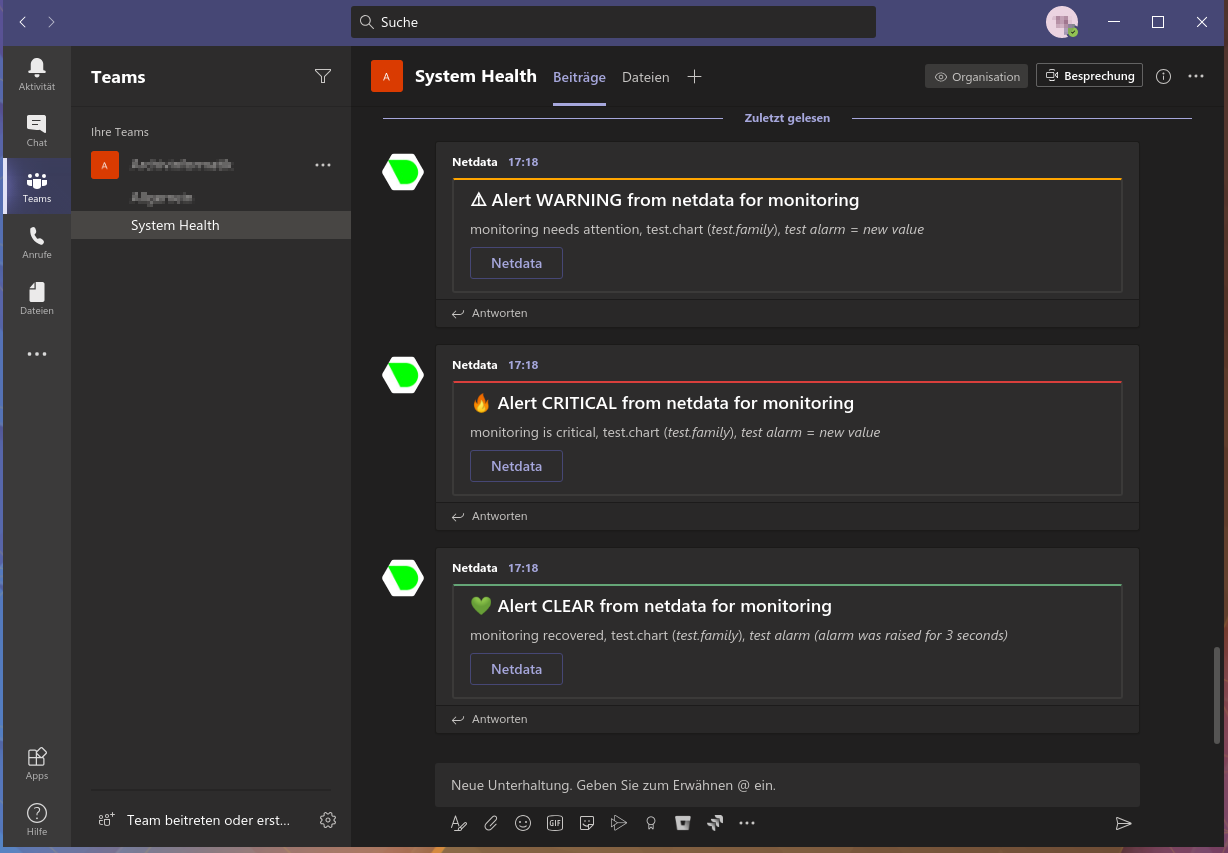Microsoft Teams
This is what you will get:

You need:
- The incoming webhook URL as given by Microsoft Teams. You can use the same on all your Netdata servers (or you can have multiple if you like - your decision).
- One or more channels to post the messages to.
In Microsoft Teams the channel name is encoded in the URI after /IncomingWebhook/ (for clarity the marked with [] in the following example): https://outlook.office.com/webhook/XXXXXXXX-XXXX-XXXX-XXXX-XXXXXXXXXXXX@XXXXXXXX-XXXX-XXXX-XXXX-XXXXXXXXXXXX/IncomingWebhook/[XXXXXXXXXXXXXXXXXXXXXXXXXXXXXXXX]/XXXXXXXX-XXXX-XXXX-XXXX-XXXXXXXXXXXX
You have to replace the encoded channel name by the placeholder CHANNEL in MSTEAMS_WEBHOOK_URL. The placeholder CHANNEL will be replaced by the actual encoded channel name before sending the notification. This makes it possible to publish to several channels in the same team.
The encoded channel name must then be added to DEFAULT_RECIPIENTS_MSTEAMS or to one of the specific variables role_recipients_msteams[]. At least one channel is mandatory for DEFAULT_RECIPIENTS_MSTEAMS.
Set the webhook and the recipients in /etc/netdata/health_alarm_notify.conf (to edit it on your system run /etc/netdata/edit-config health_alarm_notify.conf), like this:
SEND_MSTEAMS="YES"
MSTEAMS_WEBHOOK_URL="https://outlook.office.com/webhook/XXXXXXXX-XXXX-XXXX-XXXX-XXXXXXXXXXXX@XXXXXXXX-XXXX-XXXX-XXXX-XXXXXXXXXXXX/IncomingWebhook/CHANNEL/XXXXXXXX-XXXX-XXXX-XXXX-XXXXXXXXXXXX"
DEFAULT_RECIPIENT_MSTEAMS="XXXXXXXXXXXXXXXXXXXXXXXXXXXXXXXX"
You can define multiple recipients by listing the encoded channel names like this: XXXXXXXXXXXXXXXXXXXXXXXXXXXXXXXX YYYYYYYYYYYYYYYYYYYYYYYYYYYYYYYY.
This example will send the alarm to the two channels specified by their encoded channel names.
You can give different recipients per role using these (in the same file):
role_recipients_msteams[sysadmin]="XXXXXXXXXXXXXXXXXXXXXXXXXXXXXXXX"
role_recipients_msteams[dba]="YYYYYYYYYYYYYYYYYYYYYYYYYYYYYYYY"
role_recipients_msteams[webmaster]="ZZZZZZZZZZZZZZZZZZZZZZZZZZZZZZZZ"
Was this page helpful?
Need further help?
Search for an answer in our community forum.
Contribute
- Join our community forum
- Learn how to contribute to Netdata's open-source project
- Submit a feature request